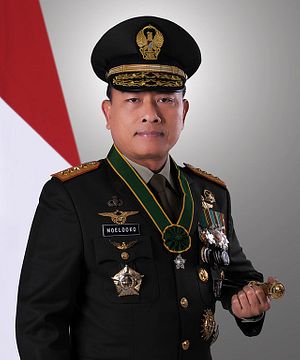As Indonesia’s outspoken military (TNI) chief General Moeldoko nears his mandatory retirement age next month, the conversation has moved on to who will be replacing him (See: “Indonesia Keen on Big Brother Role in ASEAN and Beyond: Official”).
Selecting a candidate is normally a fairly straightforward process. Candidates for the top TNI post should be flag officers who have held the position of chief of staff in one of the TNI’s three forces – the Army, the Navy or the Air Force. The current officers would be Army chief of staff Gen. Gatot Nurmantyo, Navy chief of staff Adm. Ade Supandi and Air Force chief of staff Air Chief Marshal Agus Supriatna.
Furthermore, since the end of the Suharto era, the post has been rotated in an Army-Navy-Army-Air Force pattern which has held until today. For instance, Moeldoko, who had been army chief of staff, took over in 2013 from Adm. Agus Suhartono, who has been chief of staff of the Indonesian navy. Following this pattern, since Moeldoko was from the Army, the next TNI chief should be from the Air Force, which would suggest that Air Force chief of staff Air Chief Marshal Agus Supriatna should be Indonesia’s next military chief.
But on Wednesday, The Jakarta Post reported that Coordinating Political Legal and Security Affairs Minister Tedjo Edhy Purdijatno had said that Indonesian president Joko “Jokowi” Widodo had yet to make up his mind and that the next TNI chief may not necessarily be from the air force.
“Yes, there is an unwritten agreement that three branches of the TNI, namely the Indonesian Army, Air Force and Navy, will take turns in taking the position of the military commander. However, it is not set in stone and the President has yet to decide,” Tedjo said on the sidelines of a national cybersecurity symposium in Central Jakarta.
The position itself is not a new one. Even though the post has rotated in that fashion since 1999 with the appointment of the first non-Army TNI chief Adi Sutjipto and has lasted through six TNI chiefs since then up to Moeldoko, the appointment of the TNI chief is still the president’s prerogative.
Some lawmakers are also urging Jokowi to make the decision soon. Moeldoko reaches his mandatory retirement age of 58 in July, and his successor would ideally be recommended and then subsequently confirmed by the House by then. But since the House would be on recess from June 10 until early August, Jokowi would need to submit his recommendation soon in order to ensure that a new TNI commander is sworn in at least a few days before Moeldoko ends his term, notes one legislator who is a member of House Commission I on information, defense and foreign affairs.
Whoever he is, the new military chief will preside over an interesting time in Indonesian defense policy. The country is striving to achieve a Minimum Essential Force in 2024, and Jokowi and his advisers have been stressing several changes over the past few months, including transforming the country’s defense industry, increasing its military budget and the restructuring its military (See, for instance: “An Indonesian Defense Revolution Under Jokowi?” and “Indonesia Plans New Joint Military Commands”).

































